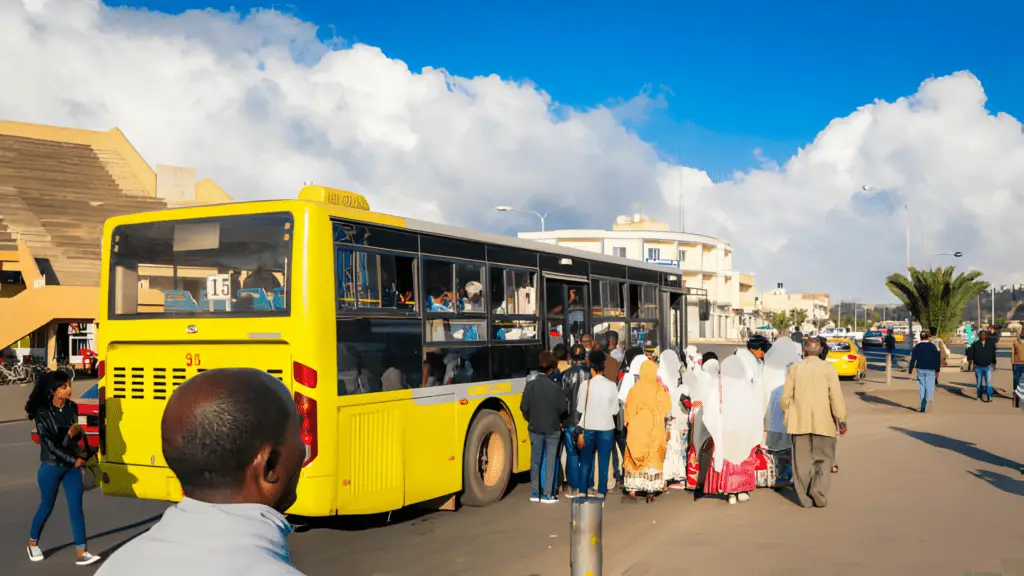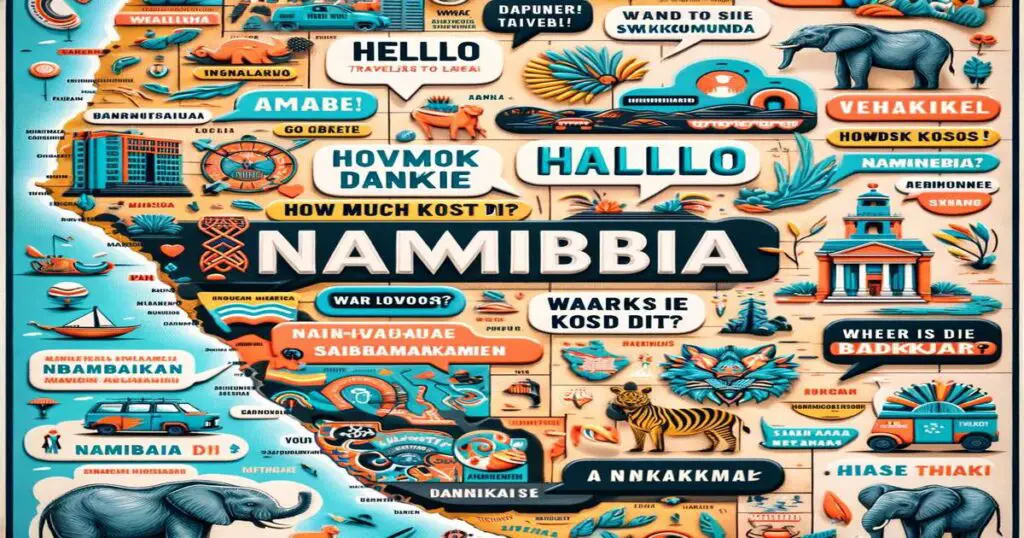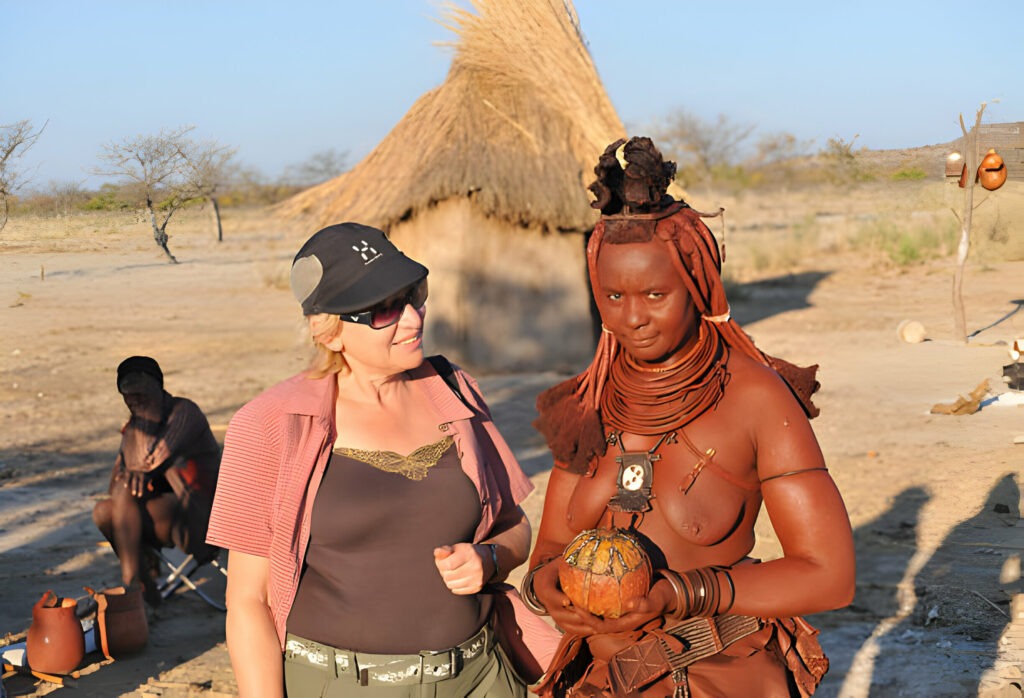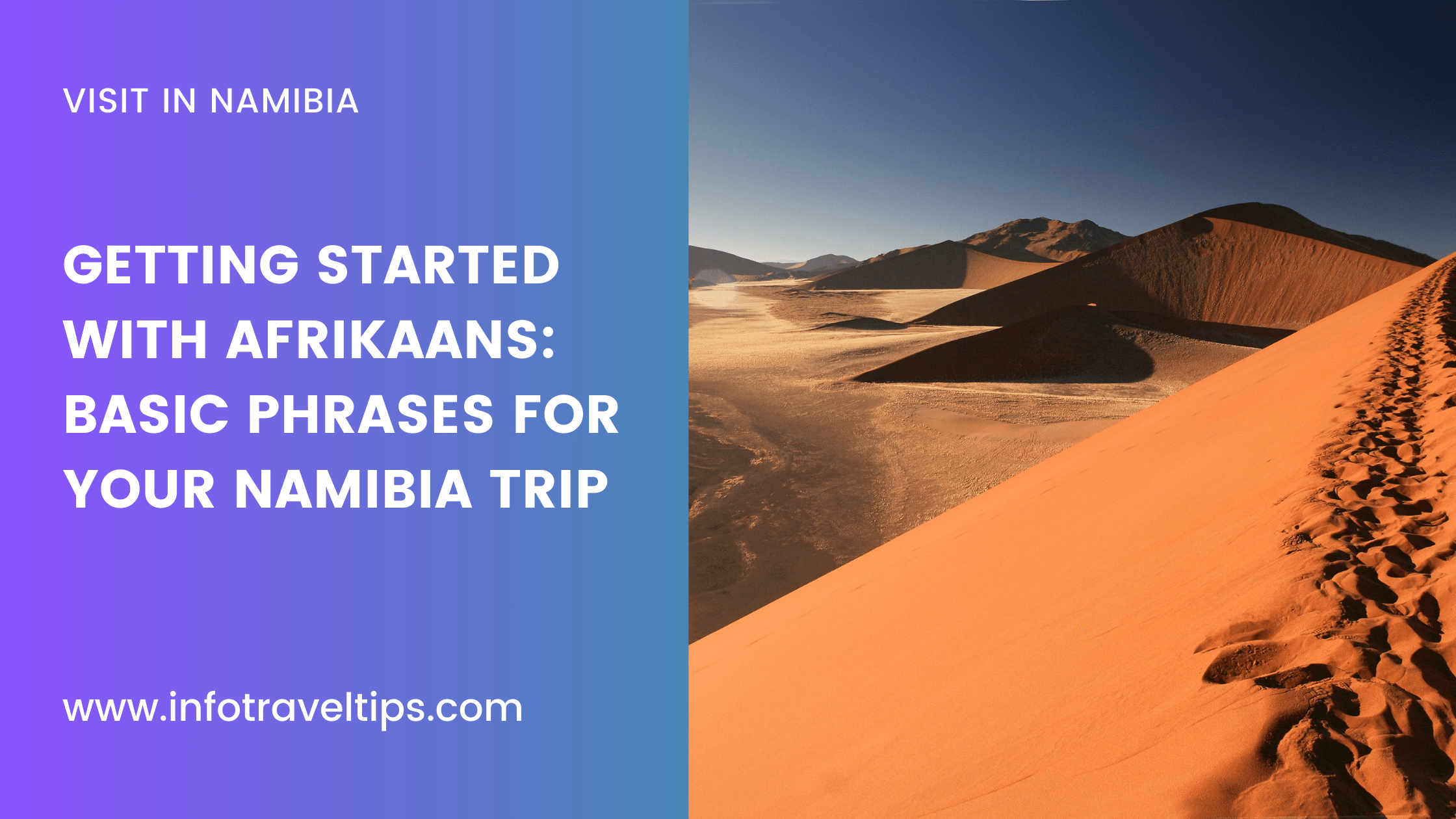Namibia, a gem of Southern Africa, offers a rich tapestry of cultural and natural wonders. A significant part of its cultural heritage is the Afrikaans language, a legacy of its historical ties with South Africa. As a traveler, getting familiar with some basic Afrikaans phrases can enrich your experience, helping you connect with locals and navigate this beautiful country with ease. Let’s dive into some essential Afrikaans phrases you’ll find useful on your Namibian adventure.
learn Afrikaans for Namibia travel
Greetings – The Key to Friendly Interactions
- Hello/Hi – Hallo / Haai
- Good morning – Goeie môre
- Good evening – Goeie naand
- Goodbye – Totsiens
Greetings are your first step in striking up a conversation. A simple ‘Hallo’ can break the ice and show respect for the local culture.
Basic Courtesies – Politeness Goes a Long Way
- Please – Asseblief
- Thank you – Dankie
- You’re welcome – Dis ‘n plesier
- Excuse me/Sorry – Verskoon my
Whether you’re asking for directions or making a purchase, these phrases are fundamental to polite conversation.
Getting Around – Directions and Transportation
- Where is…? – Waar is…?
- How far? – Hoe ver?
- Right – Regs
- Left – Links
- Straight ahead – Reguit voor
Navigating through Namibian towns or the countryside becomes much simpler when you know these basic directional phrases.
Dining Out – Enjoying Namibian Cuisine
- I would like… – Ek wil graag hê…
- Water – Water
- Menu – Spyskaart
- Bill, please – Rekening, asseblief
These phrases will help you order food and handle transactions in eateries across Namibia.

Shopping – For Souvenirs and Essentials
- How much is this? – Hoeveel kos dit?
- Can I pay with a card? – Kan ek met ‘n kaart betaal?
- I’m just looking, thanks – Ek kyk net, dankie
Shopping in local markets and stores becomes a smooth experience with these phrases.
Emergency Phrases – Safety First
- Help! – Help!
- I need a doctor – Ek het ‘n dokter nodig
- Where is the hospital? – Waar is die hospitaal?
While we hope you won’t need these, it’s always best to be prepared.
Making Connections – Social Interactions
- My name is… – My naam is…
- What is your name? – Wat is jou naam?
- I am from… – Ek is van…
These are great conversation starters and help in making new friends.
Embracing the Local Culture
As you travel through Namibia, using these Afrikaans phrases will not only enhance your communication but also enrich your understanding of the local culture. Afrikaans is more than just a means of communication; it’s a doorway to understanding the country’s history, traditions, and people.

Quick Tips for Language Learning on the Go
- Practice Daily: Try to use new phrases as often as possible in everyday situations.
- Lobserve and Absorb: Take note of the way locals converse. The rhythm and pronunciation can be as important as the words themselves.
- Carry a Phrasebook: A small Afrikaans phrasebook or a language app on your phone can be a handy reference.
- Don’t Be Afraid to Make Mistakes: Locals usually appreciate your effort to speak their language, even if it’s not perfect.
Understanding Local Responses
When you start using these phrases, you’ll likely receive responses in Afrikaans. Avoid worrying if you can’t grasp everything right away. You can always smile and say, “Ek praat ‘n bietjie Afrikaans” (I speak a little Afrikaans) or “Kan jy asseblief stadiger praat?” (Can you please speak slower?).
Beyond the Basics
Once you’re comfortable with these basic phrases, you might want to expand your vocabulary to include topics like weather (weer), hobbies (stokperdjies), or even local slang. This deeper dive into the language will not only be fun but also give you a more authentic experience during your travels.
Immersing in the Local Scene
As you continue your journey in Namibia, immersing yourself in local events and traditions can be greatly enhanced by your growing knowledge of Afrikaans. Attending local festivals, markets, or community gatherings while using your Afrikaans skills can offer a more authentic and engaging experience.
Cultural Etiquette and Respect
Understanding a bit of Afrikaans also means you’ll be more attuned to cultural nuances and etiquette. For example, addressing elders respectfully or understanding local humor. This not only shows your respect but also deepens your cultural understanding.

Enhancing Your Travel Experience
- Local Friendships: Your attempt to speak Afrikaans can lead to lasting friendships with locals.
- Unique Experiences: Being able to communicate in Afrikaans might open doors to experiences that are typically not accessible to tourists.
- Personal Growth: Learning a new language challenges your brain, enhances cognitive skills, and boosts your confidence.
Documenting Your Journey
Consider documenting your learning journey and travel experiences in a blog or on social media. Sharing your struggles and triumphs with Afrikaans can inspire others and also serve as a wonderful personal memoir of your travels.
Interview with a Local
In the heart of Namibia, where the vibrant culture meets the breathtaking landscapes, the Afrikaans language plays a significant role in daily life and cultural identity. To gain deeper insights, we sat down with Johan, a lifelong resident of Windhoek, for an enlightening conversation about the role of Afrikaans in Namibia.

Q: Johan, thank you for joining us. Can you tell us about the role of Afrikaans in Namibia?
Johan: Thank you for having me. Afrikaans is more than just a language here; it’s a bridge between different ethnic groups. It connects us with our history and with each other. It’s widely spoken and understood, making it a key tool for communication in our diverse society.
Q: How has Afrikaans influenced Namibian culture?
Johan: It’s had a huge impact. You see it in our music, literature, and even in the way we tell stories. Afrikaans has a unique rhythm and expressiveness that resonates well with the Namibian spirit – it’s both direct and rich in metaphors.
Q: Is Afrikaans important for tourists to learn before visiting Namibia?
Johan: While it’s not essential, as many Namibians speak English, knowing some Afrikaans can greatly enhance your experience. It shows respect for our culture and can open doors to more authentic interactions with locals.
Q: Can you share a favorite Afrikaans phrase that holds special meaning in Namibian culture?
Johan: One phrase that comes to mind is _’n Boer maak ‘n plan’ which means ‘a farmer makes a plan.’ It reflects the Namibian attitude of resourcefulness and resilience, the ability to make the best of any situation.
Q: What aspects of Namibian culture are best experienced through the Afrikaans language?
Johan: Our storytelling and humor. There’s a certain wit and playfulness in Afrikaans that captures the essence of our culture. Also, many traditional Afrikaans recipes and songs are best enjoyed in their original language.
Q: How do you see the future of Afrikaans in Namibia?
Johan: I see it continuing to be a vital part of our cultural fabric. It’s evolving, blending with local languages and cultures, which keeps it vibrant and relevant.
Q: Finally, what advice would you give to someone trying to learn Afrikaans?
Johan: Be patient and practice as much as you can with locals. We love it when visitors try to speak our language and are more than happy to help you learn.
Q: Johan, what are some common misconceptions about Afrikaans and its speakers in Namibia?
Johan: A common misconception is that Afrikaans is only spoken by certain ethnic groups. In reality, it’s a language that transcends ethnic boundaries in Namibia. People from various backgrounds speak it, and it serves as a unifying language in many ways.
Q: How is Afrikaans taught and preserved in Namibia?
Johan: Afrikaans is taught in schools as part of the curriculum. We also have cultural festivals and events where Afrikaans literature, poetry, and music are celebrated. This helps in keeping the language and its cultural aspects alive and thriving.
Q: Can you share an example of Afrikaans influence in Namibian music or art?
Johan: Certainly. In Namibian music, especially in genres like ‘Boeremusiek’, you can hear the influence of Afrikaans. It’s not just in the language of the lyrics but also in the style and instruments used. In art, Afrikaans influences can be seen in storytelling themes and the names of art pieces.
Q: Do you think understanding Afrikaans changes a visitor’s perspective on Namibia?
Johan: Absolutely. Knowing the language, even at a basic level, can give visitors a much deeper appreciation of our way of life, our jokes, stories, and the general way we express ourselves. It adds a layer of depth to the travel experience.
Q: Finally, is there a particular place in Namibia where Afrikaans culture is most prominently celebrated?
Johan: The capital city, Windhoek, has a vibrant Afrikaans-speaking community. But smaller towns like Swakopmund and Lüderitz also have rich Afrikaans cultural influences. Festivals in these areas are great places to experience Afrikaans culture in full swing.
Conclusion
Learning Afrikaans phrases isn’t just about practicality; it’s a gesture of respect towards the local culture and an attempt to immerse yourself more deeply in the Namibian experience. While English is widely spoken, your efforts to speak Afrikaans will be appreciated and often reciprocated with warmth and friendliness.


